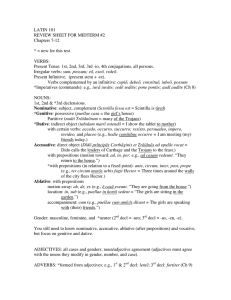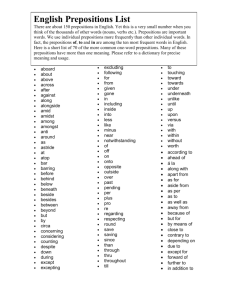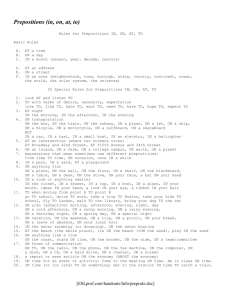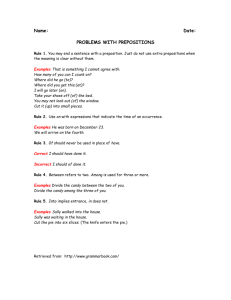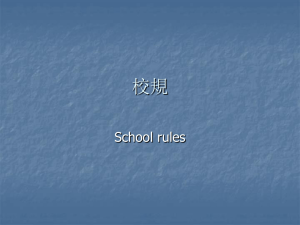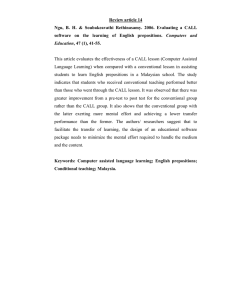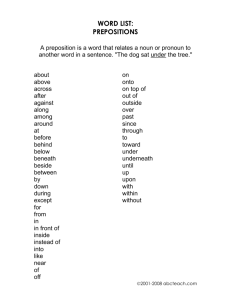LATIN 101 REVIEW SHEET FOR FINAL OLC, Chapters 13-17
advertisement
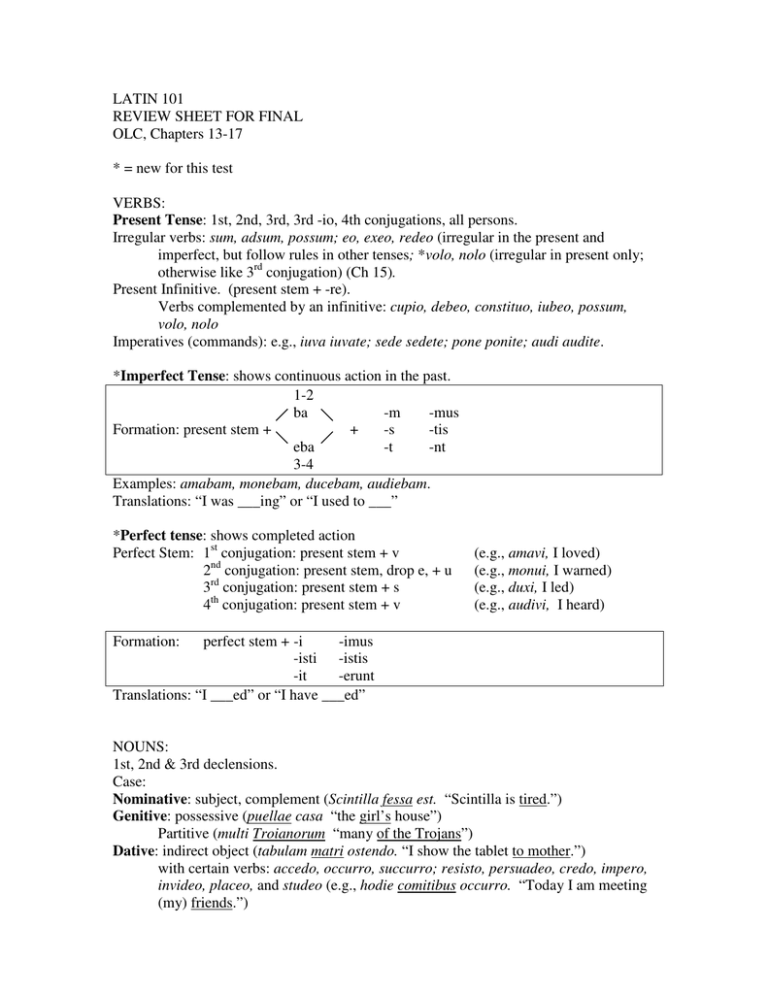
LATIN 101 REVIEW SHEET FOR FINAL OLC, Chapters 13-17 * = new for this test VERBS: Present Tense: 1st, 2nd, 3rd, 3rd -io, 4th conjugations, all persons. Irregular verbs: sum, adsum, possum; eo, exeo, redeo (irregular in the present and imperfect, but follow rules in other tenses; *volo, nolo (irregular in present only; otherwise like 3rd conjugation) (Ch 15). Present Infinitive. (present stem + -re). Verbs complemented by an infinitive: cupio, debeo, constituo, iubeo, possum, volo, nolo Imperatives (commands): e.g., iuva iuvate; sede sedete; pone ponite; audi audite. *Imperfect Tense: shows continuous action in the past. 1-2 ba -m -mus Formation: present stem + + -s -tis eba -t -nt 3-4 Examples: amabam, monebam, ducebam, audiebam. Translations: “I was ___ing” or “I used to ___” *Perfect tense: shows completed action Perfect Stem: 1st conjugation: present stem + v 2nd conjugation: present stem, drop e, + u 3rd conjugation: present stem + s 4th conjugation: present stem + v (e.g., amavi, I loved) (e.g., monui, I warned) (e.g., duxi, I led) (e.g., audivi, I heard) Formation: perfect stem + -i -imus -isti -istis -it -erunt Translations: “I ___ed” or “I have ___ed” NOUNS: 1st, 2nd & 3rd declensions. Case: Nominative: subject, complement (Scintilla fessa est. “Scintilla is tired.”) Genitive: possessive (puellae casa “the girl’s house”) Partitive (multi Troianorum “many of the Trojans”) Dative: indirect object (tabulam matri ostendo. “I show the tablet to mother.”) with certain verbs: accedo, occurro, succurro; resisto, persuadeo, credo, impero, invideo, placeo, and studeo (e.g., hodie comitibus occurro. “Today I am meeting (my) friends.”) Accusative: direct object (Dido principes Carthaginis et Troianos ad epulas vocat. “Dido calls the leaders of Carthage and the Trojans to the feast.”) Motion toward: spatial (answers the question quo? where to?) with prepositions: ad, in, per, trans (e.g., ad casam redeunt. “They return to the house.”) With prepositions (in relation to a fixed point): ante, circum, inter, post, prope (e.g., ter circum muros urbis fugit Hector. “Three times around the walls of the city flees Hector.”) Ablative: Motion away: (answers the question unde? where from?) with prepositions: a/ab, de, e/ex (e.g., e casa exeunt. “They are going from the house.”) *No prepositions used with the names of cities, towns, and small islands, and domus (e.g., Roma exeunt. “They are going from Rome.”) Location: spatial (answers the question ubi? where?) With prepositions: in, sub (e.g., puellae in agro sedent = The girls are sitting in the field) Gender: masculine, feminine (3rd decl.= -s, -o, -x, except civis, custos, flos, ignis, iuvenis, miles, parens, centurio, and senex), and neuter (2nd decl = -um; 3rd decl = -us, -en, -e). *PRONOUNS: Personal pronouns: ego, tu, nos, vos -- focus on nom, acc, & dat, sing. & pl) (Ch 14) Relative pronouns: qui, quae, quod -- just nominative (who, which) (Ch 13) Reflexive pronouns (me, te, se; nos, vos, se -- these are accusative, but focus on dative as well as singular & plural). (Ch 14) Demonstrative pronouns: is, ea, id; ille, illa, illud; hic haec hoc (Ch. 15) Intensive pronoun: ipse ipsa ipsum (e.g., he himself) (Ch. 15) ADJECTIVES: all cases and genders; noun/adjective agreement (adjectives must agree with their nouns in gender, number, and case). ADVERBS: formed from adjectives: e.g., 1st & 2nd decl: lente; 3rd decl: fortiter (Ch 9) PREPOSITIONS: ad, in, per, trans; circum, extra, inter, prope; a/ab, e/ex; cum, sine; in, sub OTHER GRAMMAR: SV, SOV, & SCV word order. -que (just need to recognize it). (Ch 8) *Subordinate clauses (introduced by subordinating conjunctions dum, quod, si, ubi). *Relative clauses (introduced by a relative pronoun qui, quae, quod - you only need the nominative singular and plural of these for now). (Ch 13) CULTURE: Roman religion; Outline of Roman history; Stories of Cincinnatus and Cloelia; Roman elections VOCABULARY FOR FINAL (Chapters 1-17) NOUNS: 1st fem: aqua, aura, casa, cena, dea, divitiae (pl. only), domina, fabula, fama, familia, femina, filia, forma, gloria, hasta, hora, ianua, insula, ira, littera, patria, pecunia, porta, puella, pugna, regina, statua, terra, toga, unda, via 1st masc: nauta 2nd masc: ager, amicus, animus, candidatus, cibus, colonus, deus, equus, filius, locus, ludus, magister, maritus, murus, numerus, nuntius, oculus, populus, puer, somnus, sonus, ventus, vir 2nd neut: arma (n. pl.), auxilium, bellum, caelum, castra (n. pl.), consilium, exemplum, frumentum, imperium, moenia (n. pl.), periculum, praesidium, proelium, saxum, templum, verbum, vinum 3rd masc: amor, centurio, clamor, consul, custos, dictator, flos, frater, iuvenis, imperator, iuvenis, labor, miles, pater, princeps, rex, senex fem: arbor, hiems, legio, lux, mater, oratio, pax, uxor, virgo, virtus, vox common: canis, comes, homo, obses, parens neut: carmen, flumen, foedus, litus, nomen, vulnus 3rd i-stem masc: (gen pl = -ium) civis, collis, hostis, mons fem: (gen pl = -ium) mors, navis, nox, urbs neut: (abl sg = -i; nom & acc pl = -ia; gen pl = -ium) mare ADJECTIVES: 1st and 2nd decl: alius, anxius, bonus, candidus, carus, ceteri (pl. only), dignus, divinus, fessus, (hic, haec, hoc), ignotus, (ille illa illud), (ipse, ipsa, ipsum), iratus, (is ea id), laetus, liber, magnus, malus, meus, miser, mortuus, multus, noster, notus, novus, nullus, optimus, paratus, parvus, pauci (pl. only), pessimus, primus, pulcher, solus, summus, suus, tacitus, territus, tantus, totus, tuus, vester, verus 3rd decl i-stem: (abl sg = -i; gen pl = -ium; nom & acc neut pl = -ia) fortis, gravis, incolumis, omnis, tristis 3rd decl: (1 ending) felix, infelix, ingens (i.e. ingens unda, ingens equus, ingens saxum vs misera puella, miser puer, miserum verbum), pauper PRONOUNS: ego & tu (focus on nom, acc, & dat, sing. & pl); hic haec hoc, ille illa illud, is ea id; nemo; qui quae quod (nom. sg. and pl.); quidam quaedam quoddam; se (acc) VERBS: (plus compound verbs) 1st: aedifico, ambulo, amo, ceno, clamo, curo, despero, do, erro, evigilo, excito, expecto, festino, habito, impero, intro, iuvo, laboro, laudo, lavo, libero, narro, navigo, oppugno, oro, paro, porto, pugno, rogo, saluto, servo, specto, sto, supero, tempto, voco 2nd: debeo, doceo, exerceo, gaudeo, habeo, iaceo, invideo, iubeo, maneo, moneo, placeo, respondeo, sedeo, taceo, teneo, timeo, video, 3rd: accedo, ago, ascendo, bibo, cado, cano, cognosco, colo, constituo, contendo, credo, curro, dedo, defendo, depono, dico, discedo, duco, emo, evado, gero, lego, ludo, mitto, occido, occurro, ostendo, peto, pono, posco, procedo, promitto, quaero, quiesco, reddo, repello, resisto, relinquo, rumpo, scribo, succurro, surgo, tollo, trado, verto, vinco, vivo, vendo 3rd -io: accipio, capio, conicio, cupio, efficio, facio, fugio, iacio 4th: advenio, audio, convenio, circumvenio, custodio, dormio, invenio, venio irregular: eo, (fero), inquit (just 3rd sing & pl), nolo, possum, sum, volo (plus compounds of eo [Part 2, p. 14]; compounds of sum: adsum, possum) ADVERBS: Spatial: eo, hic, huc, ibi, illuc, procul Temporal: diu, heri, hodie, iam, interea, iterum, lente, mox, nunc, postea, postridie, saepe, semper, statim, subito Logical: deinde, enim, igitur, itaque, primum, quoque, tandem Contrast: tamen Manner: etiam, ita, sic Negation: haud, non, numquam, vix PREPOSITIONS: (accusative) ad, in, per, trans; ante, circum, inter, post, prope PREPOSITIONS: (ablative) a/ab, cum de, e/ex; in, sub; cum CONJUNCTIONS: (coordinating) aut...aut, et, et…et, nam, nec…nec/neque…neque que, non solum…sed etiam, sed CONJUNCTIONS: (subordinating) cum, dum, quod, si, ubi INTERROGATIVES: cur, qualis, quantus, quomodo, ubi, nonne, -ne Nom. Gen. Dat. Acc. quis (who?) cuius (whose?) cui (to/for whom?) quem (whom?) quid (what?) quid (what?)
